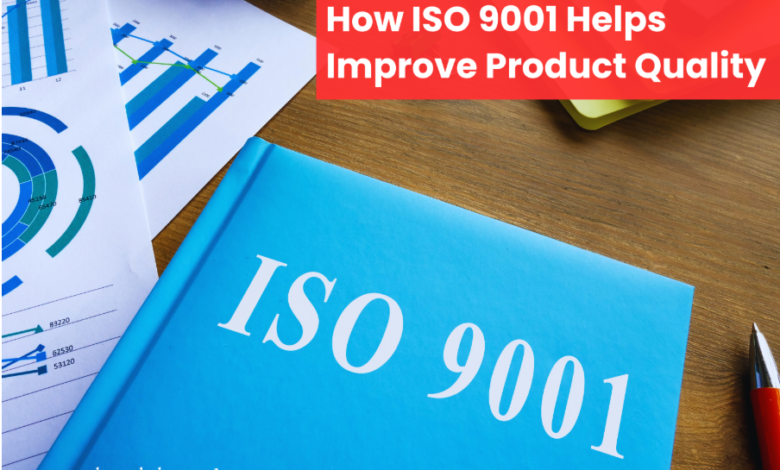How ISO 9001 Helps Improve Product Quality

You must have heard Quality over Quantity, that is the case with ISO 9001 and for this standard, quality matters. Whether you run a manufacturing business or offer services, customers expect reliability. If quality slips, trust is lost. ISO 9001 Training provides handling quality in an organised way and meets ISO 9001 standards. Before we move any further, let‘s clearly understand, What is ISO 9001? It is a widely known Quality Management System (QMS) created to help companies increase speed and improve customer happiness. But how exactly does ISO 9001 certification help improve product quality? Let’s explore.
How ISO 9001 Enhances Quality Product at Every Level
Let’s dive into how ISO 9001 drives superior product quality and operational excellence across businesses:
Establishing a Robust Quality Foundation
ISO 9001 represents a certification and dedication to quality. It outlines the QMS that assists enterprises in establishing explicit standards. Thoroughly documented procedures minimise the potential for mistakes. Employees adhere to systematic routines and minimise disparities in output.
A well-executed ISO 9001 Quality Management System facilitates the early detection of faults. Instead of waiting for complaints, businesses can prevent problems before they happen. This positive approach makes clients happier. Businesses that use ISO 9001 over time develop a strong image for reliability.
Data-Driven Decision Making
Companies often generate assumptions on effective strategies. However, ISO 9001 emphasises data-centricity. Organisations monitor key performance indicators (KPIs) to detect deficiencies in quality. Decisions are informed by empirical knowledge rather than conjecture.
For instance, if a manufacturer observes an increase in faults, the data uncovers trends. Are the materials defective? Is the training inadequate? ISO 9001 promotes the analysis of trends, the implementation of remedial measures, and the pursuit of continuous improvement within organisations. Regular audits guarantee that quality remains paramount, averting long-term complications. A well-monitored system enables the early identification of developing dangers before they escalate into substantial issues.
Enhancing Supplier Quality
Your suppliers influence the quality of your goods. Substandard materials compromise the quality of the product. ISO 9001 assists organisations in establishing rigorous supplier assessment procedures. Organisations evaluate suppliers according to quality, timeliness, and dependability.
Firms mitigate problems such as faulty components or variable raw materials by ensuring supplier accountability. What is the outcome? Superior goods and fewer recalls. Enhancing supplier connections yields enduring advantages, such as cost reductions and expedited manufacturing cycles. Companies collaborating with reliable suppliers have fewer interruptions in their supply chain.
Stronger Customer Focus
Quality beyond mere compliance with internal standards encompasses the surpassing of consumer expectations. A fundamental element of ISO 9001 is customer satisfaction. Enterprises systematically collect feedback and use it for development.
ISO 9001 mandates that enterprises heed consumer feedback via surveys, reviews, or complaints. Should a pattern of discontent arise, the system facilitates modifying procedures to address the issues efficiently. Satisfied clients are more inclined to return and endorse a firm to others. Fostering robust customer connections results in sustained growth and increased brand loyalty.
Reducing Waste and Costs
Inferior goods result in waste—both temporally and materially. ISO 9001 enhances efficiency by guaranteeing optimal resource utilisation. Optimised procedures result in reduced faults, hence decreasing rework and minimising production expenses.
Organisations adhering to ISO 9001 standards often see a decrease in operating expenses. By detecting inefficiencies, firms eliminate waste, enhancing operational sustainability. An improved system optimises turnaround times, enabling enterprises to expedite product delivery. Organisations that minimise waste simultaneously promote environmental sustainability, thus enhancing their company brand.
Boosting Employee Involvement
Employees are crucial in maintaining quality. If individuals are distracted or uncertain about standards, errors occur. ISO 9001 cultivates a culture of collective accountability for quality.
Comprehensive training enhances workers’ comprehension of their responsibilities. They are also urged to propose enhancements, making the workplace more dynamic and adaptive. When teams assume responsibility for quality, overall performance improves. Motivated personnel exhibit increased productivity, resulting in enhanced efficiency and creativity. Organisations with committed employees exhibit reduced turnover rates and enhanced workplace morale.
Gaining a Competitive Edge
Currently, several clients and associates choose to collaborate with ISO 9001-certified enterprises. It denotes trust, dependability, and efficacy. In competitive sectors, certification may be the pivotal element in obtaining contracts.
Obtaining ISO 9001 is beyond just conformity; it signifies differentiation. Customers are more inclined to remain loyal to a company committed to continual development. A well-executed QMS enhances a business’s reputation for quality, facilitating expansion into new markets. Organisations that uphold rigorous standards via ISO 9001 often surpass rivals in quality and client confidence.
Conclusion
Quality is never an accident—it’s the result of well-planned processes. ISO 9001 Training provides organisations with the resources to maintain superior standards. From supplier control to customer satisfaction, its impact is far-reaching. A
For those looking to enhance their quality management skills, The Knowledge Academy offers free resources to set businesses on the path to long-term success.





